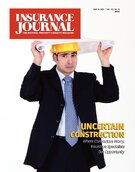Massachusetts Insurance Commissioner Michael Caljouw has rejected an industry proposal to raise workers’ compensation rates by 7.1%.
As a result, existing rates, which reflect a 14.6% decrease ordered last July, will remain in effect for policies on and after July 1, 2025.
The ruling is a setback for the industry’s rate filing organization, the Workers’ Compensation Rating and Inspection Bureau (WCRIB), which criticized last year’s decrease as “excessive” and “unreasonable.” The 2024 reduction was nearly double what WCRIB recommended (-7.6%) for a cut.
WCRIB warned that the 2024 decrease would lead to rates that would be inadequate as further post-COVID pandemic data emerged. The rate organization said that if the state had approved the 7.6% decrease it proposed for 2024, this year’s rate filing would have been for a relatively small rate decrease of 1.0%.
“Thus, rather than being able to maintain a more modest rate decrease for two years, the data now points to a rate increase to correct for the excessive decrease ordered” by the commissioner for 2024, the rating agency argued.
Despite the warning, the state has now rejected the WCRIB filing made in December for a 7.1% increase starting July 1, 2025. State officials said the denial of the 7.1% increase could save employers $80 million, while last year’s decrease saved $87 million.
The rate approval process includes hearings with testimony from WCRIB, the Division of Insurance’s own rating bureau, and the attorney general’s office. This year the attorney general recommended an average rate decrease of -6.2 % and the state rating bureau proposed a decrease for standard classifications of between -3.1 and -2.1%, and between -7.6% and -6.7% for the F-classes.
While the commissioner has the authority to set a specific rate after disapproving a rate filing, Caljouw opted to keep existing rates in effect. rather than order any change.
The commissioner is tasked with determining if WCRIB submitted sufficient evidence to show the proposed rates will not be inadequate, excessive, or unfairly discriminatory and that they fall within a range of reasonableness. He concluded the evidence did not support approval of the requested rate increase, citing questions over the provisions for loss development and underwriting profit among others.
Was this article valuable?
Here are more articles you may enjoy.


 Marine Insurers Cancel War Risk Cover as Iran Conflict Escalates
Marine Insurers Cancel War Risk Cover as Iran Conflict Escalates  Zurich Insurance Said to Near Beazley Deal Funded by Equity Sale
Zurich Insurance Said to Near Beazley Deal Funded by Equity Sale  Property, Auto Insurance Shopping Up as Consumers Feel Economic Pressures
Property, Auto Insurance Shopping Up as Consumers Feel Economic Pressures  Meta Loses Insurance for Defense in Major Social Media Addiction Litigation
Meta Loses Insurance for Defense in Major Social Media Addiction Litigation 


